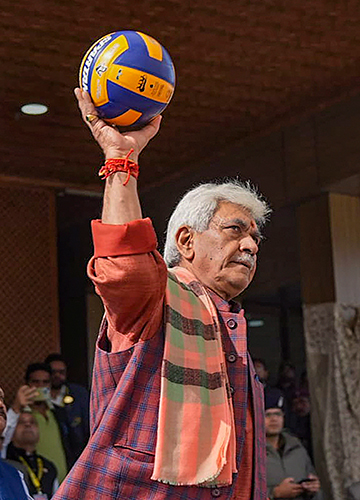THE FIRST ELECTED government in a decade in Jammu and Kashmir took office on October 16. But the transition from a state to a Union territory is posing many hurdles before Chief Minister Omar Abdullah and his cabinet in making key decisions. Lieutenant Governor Manoj Sinha, who wields more power than Abdullah does, looms above the government. And there is a growing unease, as ministers and many legislators think they are unable to fulfil their election promises. Abdullah and his ministers are struggling to deal with senior bureaucrats, especially IAS and IPS officers who report to Sinha.
Ever since he assumed office, Abdullah has been engaging with the Central government. He met Prime Minister Narendra Modi, Home Minister Amit Shah and Finance Minister Nirmala Sitharaman in Delhi.
And Abdullah does not want the new system to affect the administration. In a meeting with senior officers after returning from Delhi, he warned them against exploiting the loopholes in the “hybrid system” of governance―a structure involving two power centres. “I received assurances at the highest level that the commitments made to Jammu and Kashmir regarding the governance model will change,” he said. “Anyone believing that the Union territory status will protect them from the consequences of practices that go against this pledge should remember that this protection may only be temporary.”
To clarify the responsibilities of the two power centres, the centre is preparing new business rules for the Union territory. These rules will establish a clear framework outlining the powers and responsibilities of the chief minister, ministers, administrative secretaries and other officials. Observers, however, say the new business rules suggest that the restoration of Jammu and Kashmir’s statehood is some time away.
Now that the elections in Jharkhand and Maharashtra are over, Shah might shift his focus to Jammu and Kashmir. A committee is drafting the business rules, and it will then be submitted to the Centre for approval. While the lieutenant governor’s powers were defined in a notification by the home ministry in July, there remains a lack of clarity about the powers of the chief minister, the cabinet and administrative secretaries. The new rules are being modelled after those in Puducherry, a Union territory with a governance structure similar to Jammu and Kashmir.
“It’s alright if the business rules are being introduced for governance, but we are keen on the restoration of statehood,” said Abdul Rahim Rather, speaker of the Jammu and Kashmir assembly and senior National Conference leader. “These rules will not impact our demand for the early restoration of statehood.”
Another NC leader, who did not wish to be named, criticised the move. “The Centre should focus on restoring statehood to Jammu and Kashmir rather than introducing business rules. This suggests that the restoration of statehood could be delayed, which is not a good thing. We have the mandate of the people and should have the authority to govern without strings attached,” he said.
The BJP, however, says there is nothing much to read into the development and dismissed the claim that the new business rules will delay the restoration of statehood. “There is no mention of business rules in the Jammu and Kashmir Reorganisation Act. They were not framed then,” said Ashok Koul, the BJP’s state general secretary. “When Jammu and Kashmir was a state, business rules then were different. Now it is a Union territory, and the rules will be different.”
In the legislative domain, the speaker will lead a committee to frame the rules for the legislative assembly. Until new rules are finalised, assembly proceedings will be under the previous state’s guidelines. The upcoming budget session, scheduled for January-February, is also likely to adhere to existing rules, with Abdullah presenting the budget in his capacity as the finance minister. Though the government can have nine ministers, there are only six now. The vacancies are likely to be filled before the budget session.
The government has refrained from making any major decisions so far owing to the limitations of its powers. It has passed resolutions for the restoration of statehood and special status and also changed the examination calendar back to November-December. Sinha had moved it to March like the rest of the country. Abdullah also converted his official residence in Srinagar into an office for public grievances and welfare, where he would be directly engaging with the people.
So far Abdullah has avoided any confrontation with Sinha. And the Centre, too, has not asserted its authority, probably because of the thumping mandate the NC-Congress alliance had in the assembly elections.
The implementation of business rules will be a significant step towards clarifying jurisdictions in the complexities of Jammu and Kashmir’s Union territory status. It also highlights its struggle for political autonomy and statehood. Meanwhile, the elected government faces the dual challenge of fulfilling electoral promises and navigating a governance framework defined by the Central administration.



